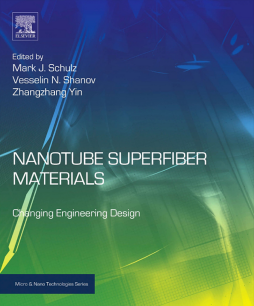
Additional Information
Book Details
Abstract
Nanotube Superfiber Materials refers to different forms of macroscale materials with unique properties constructed from carbon nanotubes. These materials include nanotube arrays, ribbons, scrolls, yarn, braid, and sheets. Nanotube materials are in the early stage of development and this is the first dedicated book on the subject. Transitioning from molecules to materials is a breakthrough that will positively impact almost all industries and areas of society.
Key properties of superfiber materials are high flexibility and fatigue resistance, high energy absorption, high strength, good electrical conductivity, high maximum current density, reduced skin and proximity effects, high thermal conductivity, lightweight, good field emission, piezoresistive, magnetoresistive, thermoelectric, and other properties. These properties will open up the door to dozens of applications including replacing copper wire for power conduction, EMI shielding, coax cable, carbon biofiber, bullet-proof vests, impact resistant glass, wearable antennas, biomedical microdevices, biosensors, self-sensing composites, supercapacitors, superinductors, hybrid superconductor, reinforced elastomers, nerve scaffolding, energy storage, and many others.
The scope of the book covers three main areas: Part I: Processing; Part II: Properties; and Part III: Applications. Processing involves nanotube synthesis and macro scale material formation methods. Properties covers the mechanical, electrical, chemical and other properties of nanotubes and macroscale materials. Different approaches to growing high quality long nanotubes and spinning the nanotubes into yarn are explained in detail. The best ideas are collected from all around the world including commercial approaches. Applications of nanotube superfiber cover a huge field and provides a broad survey of uses. The book gives a broad overview starting from bioelectronics to carbon industrial machines.
- First book to explore the production and applications of macro-scale materials made from nano-scale particles.
- Sets out the processes for producing macro-scale materials from carbon nanotubes, and describes the unique properties of these materials
- Potential applications for CNT fiber/yarn include replacing copper wire for power conduction, EMI shielding, coax cable, carbon biofiber, bullet-proof vests, impact resistant glass, wearable antennas, biomedical microdevices, biosensors, self-sensing composites, supercapacitors, superinductors, hybrid superconductor, reinforced elastomers, nerve scaffolding, energy storage, and many others.
